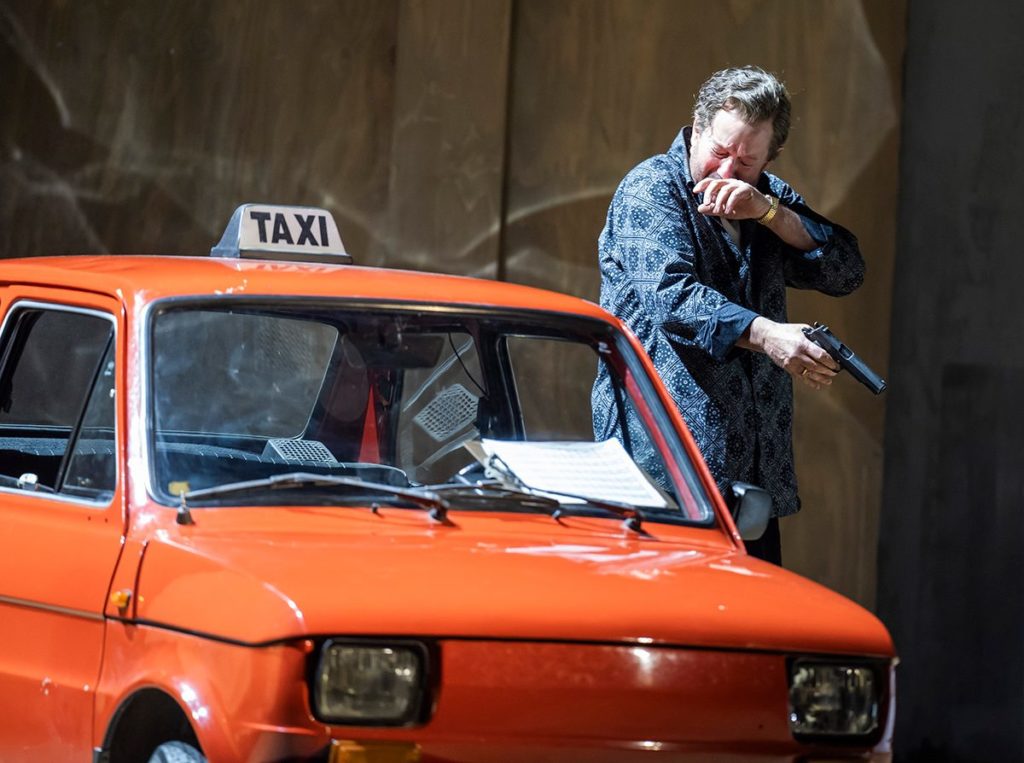
WITH his distraught features spread across both covers of the programme in close-up, there was no doubting who was to be the anti-hero of this double bill.
Robert Hayward has made a speciality of portraying twisted psychotics – his Scarpia comes straight to mind – so the pistol-packing combination of Alfio in Mascagni’s melodrama with the title role in Rakhmaninov’s graduation exercise Aleko was right up his street.
In both, jealousy prompts his character to shoot dead the tenor, in this case the luckless Andrés Presno. Hayward rose to the occasion with some of the finest singing he has ever delivered on this stage.
Karolina Sofulak had returned to revive her 2017 production of Cavalleria Rusticana while tackling the company’s first look at Aleko. Rakhmaninov completed the latter in 1892, a mere two years after the Mascagni had caused a sensation.
Sofulak was understandably at pains to point out the parallels between the two. In close association with her designers, Charles Edwards (sets and lighting) and Gabrielle Dalton (costumes), she put Cavalleria Rusticana first, the reverse of the usual order with these two pieces.
Supplanting the sunshine and lemon blossom of Sicily with the darker but equally restrictive society of Communist Poland in the 1970s, she then – inspired by Pushkin’s poem The Gypsies on which the libretto is based – conceived Aleko as taking place in a 1990s post-hippie commune, such as Freetown Christiania in Copenhagen.
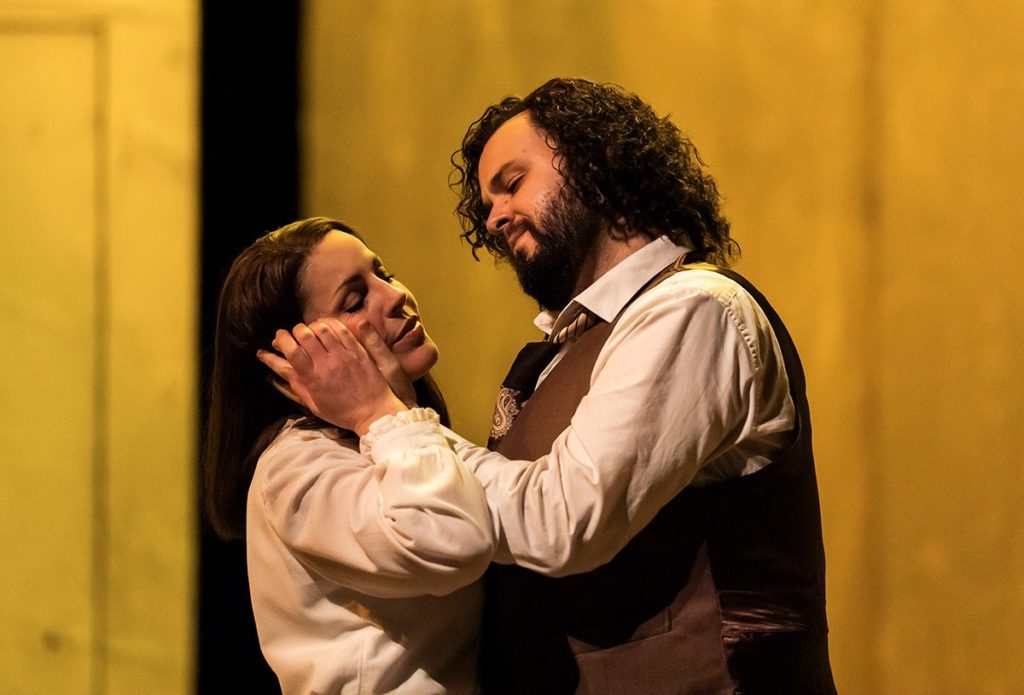
Here ‘Al’, who has by now changed the latter half of his name, is trying to liberate himself from the misdemeanours of his youth as Alfio. But his fate lies within his own dark heart, and he is unable to shake it off. It was an ingenious idea. It also put into much better perspective her staging of the Mascagni, which had not made much sense previously alongside Trial By Jury.
None of this would have worked without the conviction of Hayward. He moved convincingly from being a small-town, repressed Alfio, short of one or two marbles judging by his hesitant steps and inability to control his emotions, to a supposedly wiser, more worldly Aleko, whose anger still lay only just below the surface.
As Alfio, he was seen wringing his bloodstained hands at the end of the Mascagni. He was still wringing his hands, albeit now no longer gory, when he became Aleko. Shortly afterwards, he fondly cradled the gun he had used to shoot Turiddù (while a passenger in his beaten-up taxi), before secreting it in his suitcase.
Edwards’s set for Cavalleria Rusticana was bleak, in keeping with the deprivations of the villagers, queuing at Lucia’s counter for meagre supplies which soon ran out. It was still dominated by a huge wooden cross against which Turiddù’s outstretched arms presaged his imminent demise.
Presno’s fine tenor was almost too resonant for the role, given that his attacks were relentlessly fierce, making every note sound higher than it really was. But his depiction of emotional immaturity was telling enough.
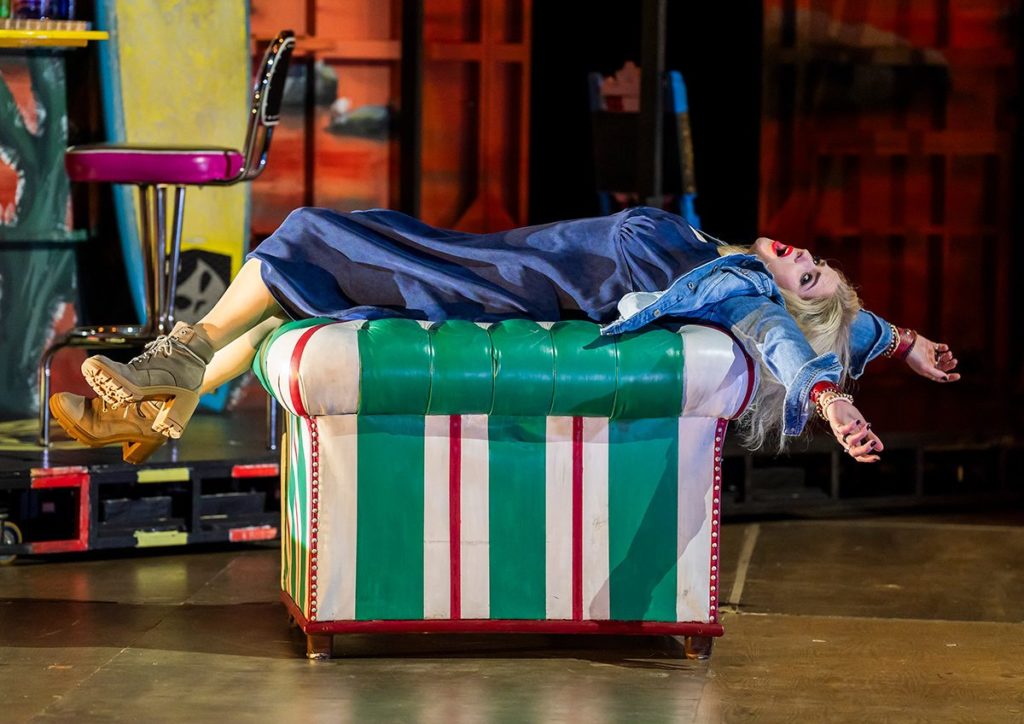
He was immensely helped by Giselle Allen’s marvellously vicious Santuzza, spitting tacks like hell-fire. Anne-Marie Owens brought all her authority to bear on Lucia, and Helen Évora’s Lola was exactly the kind of girl-next-door ingénue to catch her lover’s eye.
The set for Aleko was a total contrast, built around a flashy bar where the community seemed to be perpetually drinking or dancing (very appealingly to Tim Claydon’s choreography).
Rakhmaninov’s score has more than a suggestion of Middle Eastern flavour, especially at the start, right out of the Rimsky-Korsakov playbook. Antony Hermus latched onto this, so that his orchestra underlined the other-worldliness of the setting. Elsewhere he was quick to lend extra drama to an already highly charged atmosphere.
Aleko moves forward in a series of tableaux rather than unfolding continuously, which makes the director’s task tough. But Sofulak’s cinematic style, apparently inspired by Kieślowski, was rarely less than riveting.
Hayward’s determined baritone stole the show, with Elin Pritchard’s luscious-toned Zemfira as his faithless wife. It was a clever conceit to have Lola reappear in a vision to remind Aleko of his earlier life. Presno’s Lover had less to do here and remained much in the Turiddù mould.
Matthew Stiff as Zemfira’s father delivered a pleasing seen-it-all-before aria. The chorus relished their opportunities, especially in Aleko, while Hermus kept his orchestra at a high level of intensity. But Hayward was the true key to the evening’s success.
REVIEW: Martin Dreyer’s verdict on Opera North in Albert Herring, Howard Assembly Room, Leeds
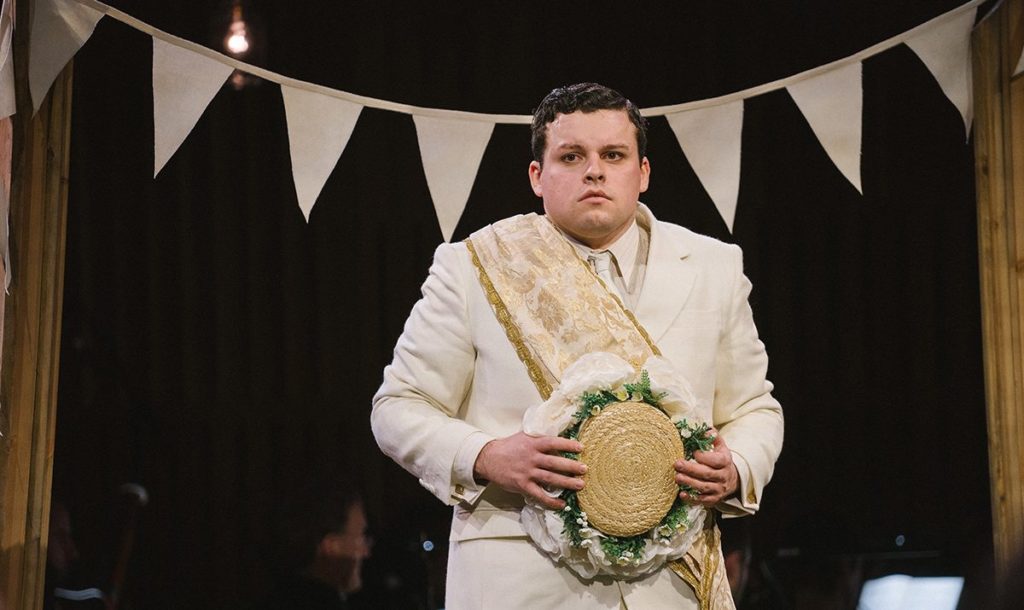
FOR the first show of Laura Canning’s reign as general director, Opera North returned to Giles Havergal’s successful production of 2013, here revived by Elaine Tyler-Hall.
As chamber-comedy, Albert Herring certainly benefited from the relative intimacy of the Howard Room, with the audience aligned three-deep on its long sides, facing inwards, and the action confined to the strip between. The orchestra was where the stage platform would normally be.
The production held fast to Havergal’s insistence that Loxford’s village stereotypes should be clearly differentiated but delivered a few carefully calculated extras. The opening scene was much enlivened by a parade of comely candidates for May Queen, all of whom looked extremely suitable but had to retreat dolefully for their alleged misdemeanours. There was a little caper by the judging panel when Lady Billows acquiesced in the choice of Albert.
Dafydd Jones, who has been a Leeds Lieder Young Artist, made his company debut in the title role with considerable aplomb, graduating smoothly from downtrodden drip to born-again bravado. His Act 2 solos as he fantasised about a better life were excellently paced.
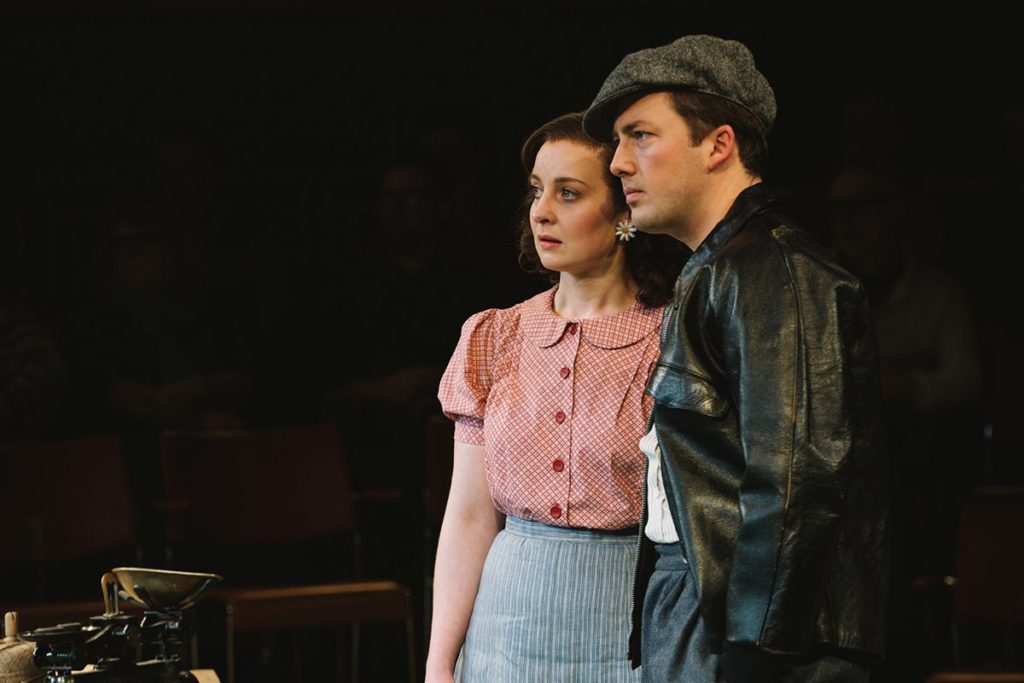
He was well supported by Dominic Sedgwick’s breezy Sid, whose aria was nicely nuanced, and Katie Bray’s assured and engaging Nancy; their love-duet was a breath of fresh air in this stuffy village.
Judith Howarth was in fine fettle as Lady Billows, superbly bolstered by Heather Shipp’s Florence Pike, who was if anything even more waspish: a formidable duo. William Dazeley, the only holdover from the original cast, was an avuncular vicar, wringing his hands in diffidence, matched in character-acting by Paul Nilon’s out-of-his-depth mayor.
Amy Freston’s twittery schoolmarm and Richard Mosley-Evans’s blustery local copper added further fuel to the farce. There was always the feeling that Claire Pascoe’s severe Mrs Herring meant well, a feather in her cap.
The threnody over Albert’s casket-to-be, which was overlaid by his tye-marked jacket, was beautifully delivered, which made Albert’s reincarnation all the more effective.
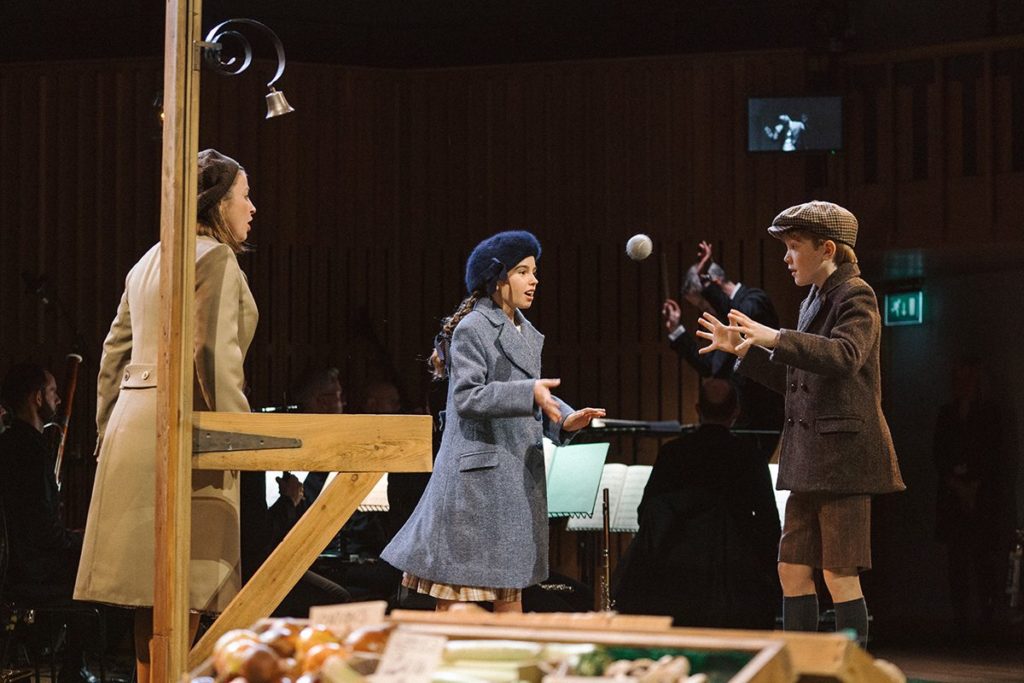
There was a strong sense of a generation gap between the young and old in this village, enhanced by the three children, who were ably led by Rosa Sparks as Emmie, a promising debutante here.
Willow Bell as Cissie and Oliver Mason as Harold were her lively underlings, all encouraged to sing properly rather than pseudo-shout. Their alternates were Lucy Eatock and Dougie Sadgrove; all four are members of the company’s Children’s Chorus. They broke into dance at the slightest excuse (movement director Tim Claydon) which added to the fun.
Vital to the success of the whole evening was the stylish contribution by Garry Walker’s orchestra, whose interludes were potently atmospheric, notably in Act 2.
Diction was not always as clean as it might have been, and some of the voices strayed into territory too forceful for this arena, but those were minor misgivings in the face of Tyler-Hall’s admirable sense of ensemble. This site-specific production could not tour, though sold out weeks in advance. It will, however, be streamed on Operavision later this year.
